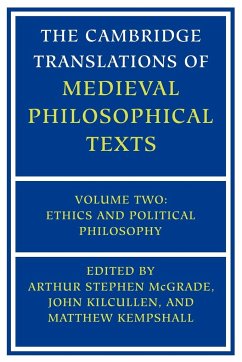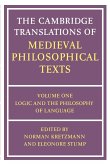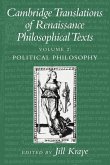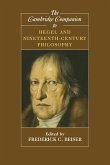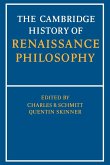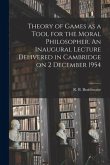Arthur Stephen McGrade / John Kilcullen / Matthew Kempshall (eds.)
The Cambridge Translations of Medieval Philosophical Texts
Volume 2, Ethics and Political Philosophy
Herausgeber: Kempshall, Matthew; McGrade, Arthur Stephen; Kilcullen, John
Arthur Stephen McGrade / John Kilcullen / Matthew Kempshall (eds.)
The Cambridge Translations of Medieval Philosophical Texts
Volume 2, Ethics and Political Philosophy
Herausgeber: Kempshall, Matthew; McGrade, Arthur Stephen; Kilcullen, John
- Broschiertes Buch
- Merkliste
- Auf die Merkliste
- Bewerten Bewerten
- Teilen
- Produkt teilen
- Produkterinnerung
- Produkterinnerung
The long-awaited second volume, contains seventeen major texts in ethics and political thought.
Andere Kunden interessierten sich auch für
![The Cambridge Translations of Medieval Philosophical Texts The Cambridge Translations of Medieval Philosophical Texts]() Norman Kretzmann / Eleonore Stump (eds.)The Cambridge Translations of Medieval Philosophical Texts98,99 €
Norman Kretzmann / Eleonore Stump (eds.)The Cambridge Translations of Medieval Philosophical Texts98,99 €![Cambridge Translations of Renaissance Philosophical Texts, Volume II Cambridge Translations of Renaissance Philosophical Texts, Volume II]() Cambridge Translations of Renaissance Philosophical Texts, Volume II54,99 €
Cambridge Translations of Renaissance Philosophical Texts, Volume II54,99 €![The Cambridge Companion to Hegel and Nineteenth-Century Philosophy The Cambridge Companion to Hegel and Nineteenth-Century Philosophy]() Frederick C. Beiser (ed.)The Cambridge Companion to Hegel and Nineteenth-Century Philosophy41,99 €
Frederick C. Beiser (ed.)The Cambridge Companion to Hegel and Nineteenth-Century Philosophy41,99 €![The Cambridge Companion to Gadamer The Cambridge Companion to Gadamer]() The Cambridge Companion to Gadamer40,99 €
The Cambridge Companion to Gadamer40,99 €![The Cambridge History of Renaissance Philosophy The Cambridge History of Renaissance Philosophy]() C. B. Schmitt / Quentin Skinner / Eckhard Kessler / Jill Kraye (eds.)The Cambridge History of Renaissance Philosophy127,99 €
C. B. Schmitt / Quentin Skinner / Eckhard Kessler / Jill Kraye (eds.)The Cambridge History of Renaissance Philosophy127,99 €![The Cambridge Companion to Common-Sense Philosophy The Cambridge Companion to Common-Sense Philosophy]() The Cambridge Companion to Common-Sense Philosophy38,99 €
The Cambridge Companion to Common-Sense Philosophy38,99 €![Theory of Games as a Tool for the Moral Philosopher. An Inaugural Lecture Delivered in Cambridge on 2 December 1954 Theory of Games as a Tool for the Moral Philosopher. An Inaugural Lecture Delivered in Cambridge on 2 December 1954]() Theory of Games as a Tool for the Moral Philosopher. An Inaugural Lecture Delivered in Cambridge on 2 December 195418,99 €
Theory of Games as a Tool for the Moral Philosopher. An Inaugural Lecture Delivered in Cambridge on 2 December 195418,99 €-
-
-
The long-awaited second volume, contains seventeen major texts in ethics and political thought.
Hinweis: Dieser Artikel kann nur an eine deutsche Lieferadresse ausgeliefert werden.
Hinweis: Dieser Artikel kann nur an eine deutsche Lieferadresse ausgeliefert werden.
Produktdetails
- Produktdetails
- Verlag: Cambridge University Press
- Seitenzahl: 680
- Erscheinungstermin: 30. September 2009
- Englisch
- Abmessung: 229mm x 152mm x 40mm
- Gewicht: 1087g
- ISBN-13: 9780521280822
- ISBN-10: 0521280826
- Artikelnr.: 24285911
- Herstellerkennzeichnung
- Books on Demand GmbH
- In de Tarpen 42
- 22848 Norderstedt
- info@bod.de
- 040 53433511
- Verlag: Cambridge University Press
- Seitenzahl: 680
- Erscheinungstermin: 30. September 2009
- Englisch
- Abmessung: 229mm x 152mm x 40mm
- Gewicht: 1087g
- ISBN-13: 9780521280822
- ISBN-10: 0521280826
- Artikelnr.: 24285911
- Herstellerkennzeichnung
- Books on Demand GmbH
- In de Tarpen 42
- 22848 Norderstedt
- info@bod.de
- 040 53433511
General Introduction; 1. Questions on Book X of the ethics Albert the
Great; 2. Conscience and synderesis Bonaventure; 3. On the Rule of Princes
Giles of Rome; 4. Commentary and questions on Book III of Aristotle's
politics Peter of Auvergne; 5. Is it rational for someone without hope of a
future life to choose to die for the Commonwealth? Henry of Ghent; 6. Does
a human being following the dictates of natural reason have to judge that
he ought to love God more than himself? Godfrey of Fontaines; 7. Does a
human being have a greater natural love for God than for himself, or vice
versa? James of Viterbo; 8. Is the science of theology a speculative
science? Godfrey of Fontaines; 9. Is a subject bound to observe a statute
even when it is not evident that it promotes the common unity? Henry of
Ghent; 10. Are subjects bound to pay a tax when the need for it is not
evident? Godfrey of Fontaines; 11. Is it better to be ruled by the best man
than by the best laws? James of Viterbo; 12. May a Christian king use
unbelievers for the just defense of his kingdom? John of Naples; 13. Using
and enjoying William of Ockham; 14. Summa on ecclesiastical power
(Selections) Augustine of Ancona; 15. Is an errant individual bound to
recant at the rebuke of a superior? William of Ockham; 16. Questions on
Book X of the ethics Jean Buridan; 17. On civil lordship John Wyclif.
Great; 2. Conscience and synderesis Bonaventure; 3. On the Rule of Princes
Giles of Rome; 4. Commentary and questions on Book III of Aristotle's
politics Peter of Auvergne; 5. Is it rational for someone without hope of a
future life to choose to die for the Commonwealth? Henry of Ghent; 6. Does
a human being following the dictates of natural reason have to judge that
he ought to love God more than himself? Godfrey of Fontaines; 7. Does a
human being have a greater natural love for God than for himself, or vice
versa? James of Viterbo; 8. Is the science of theology a speculative
science? Godfrey of Fontaines; 9. Is a subject bound to observe a statute
even when it is not evident that it promotes the common unity? Henry of
Ghent; 10. Are subjects bound to pay a tax when the need for it is not
evident? Godfrey of Fontaines; 11. Is it better to be ruled by the best man
than by the best laws? James of Viterbo; 12. May a Christian king use
unbelievers for the just defense of his kingdom? John of Naples; 13. Using
and enjoying William of Ockham; 14. Summa on ecclesiastical power
(Selections) Augustine of Ancona; 15. Is an errant individual bound to
recant at the rebuke of a superior? William of Ockham; 16. Questions on
Book X of the ethics Jean Buridan; 17. On civil lordship John Wyclif.
General Introduction; 1. Questions on Book X of the ethics Albert the
Great; 2. Conscience and synderesis Bonaventure; 3. On the Rule of Princes
Giles of Rome; 4. Commentary and questions on Book III of Aristotle's
politics Peter of Auvergne; 5. Is it rational for someone without hope of a
future life to choose to die for the Commonwealth? Henry of Ghent; 6. Does
a human being following the dictates of natural reason have to judge that
he ought to love God more than himself? Godfrey of Fontaines; 7. Does a
human being have a greater natural love for God than for himself, or vice
versa? James of Viterbo; 8. Is the science of theology a speculative
science? Godfrey of Fontaines; 9. Is a subject bound to observe a statute
even when it is not evident that it promotes the common unity? Henry of
Ghent; 10. Are subjects bound to pay a tax when the need for it is not
evident? Godfrey of Fontaines; 11. Is it better to be ruled by the best man
than by the best laws? James of Viterbo; 12. May a Christian king use
unbelievers for the just defense of his kingdom? John of Naples; 13. Using
and enjoying William of Ockham; 14. Summa on ecclesiastical power
(Selections) Augustine of Ancona; 15. Is an errant individual bound to
recant at the rebuke of a superior? William of Ockham; 16. Questions on
Book X of the ethics Jean Buridan; 17. On civil lordship John Wyclif.
Great; 2. Conscience and synderesis Bonaventure; 3. On the Rule of Princes
Giles of Rome; 4. Commentary and questions on Book III of Aristotle's
politics Peter of Auvergne; 5. Is it rational for someone without hope of a
future life to choose to die for the Commonwealth? Henry of Ghent; 6. Does
a human being following the dictates of natural reason have to judge that
he ought to love God more than himself? Godfrey of Fontaines; 7. Does a
human being have a greater natural love for God than for himself, or vice
versa? James of Viterbo; 8. Is the science of theology a speculative
science? Godfrey of Fontaines; 9. Is a subject bound to observe a statute
even when it is not evident that it promotes the common unity? Henry of
Ghent; 10. Are subjects bound to pay a tax when the need for it is not
evident? Godfrey of Fontaines; 11. Is it better to be ruled by the best man
than by the best laws? James of Viterbo; 12. May a Christian king use
unbelievers for the just defense of his kingdom? John of Naples; 13. Using
and enjoying William of Ockham; 14. Summa on ecclesiastical power
(Selections) Augustine of Ancona; 15. Is an errant individual bound to
recant at the rebuke of a superior? William of Ockham; 16. Questions on
Book X of the ethics Jean Buridan; 17. On civil lordship John Wyclif.

